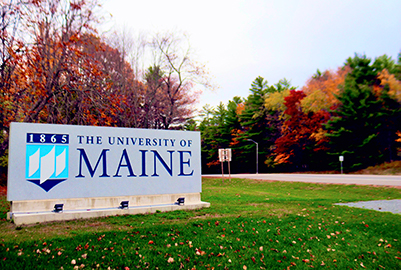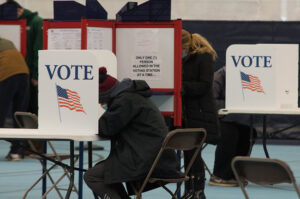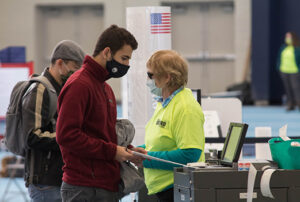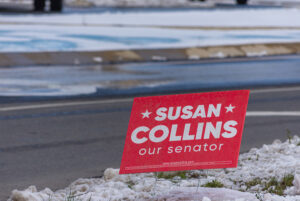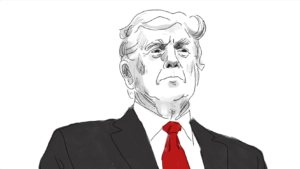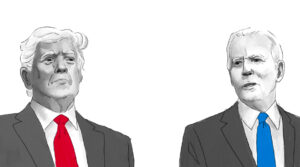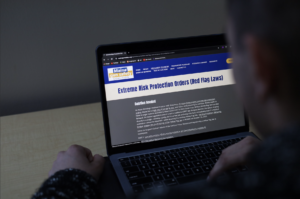On Tuesday Nov. 17, the University of Maine held a talk with Richard Powell, a professor of political science at UMaine, about the outcome of the 2020 election cycle. These meetings, held via Zoom once a month, are part of a series and help promote alumni engagement. Before the election took place, the UMaine Alumni Association held an event as part of the series in October where Powell spoke on American politics and the projected winners of state and federal elections. John Diamond, president of the UMaine Alumni Association, opened the webinar with an address to the alumni.
“Webinars have proved to be quite popular and will continue to be a regular part of our plans [and] we are really proud to have Dr. Powell with us. We are proud of all the work he does,” Diamond said.
Although this webinar was supposed to feature both Powell and Robert Glover, Glover was not able to attend the meeting. Diamond noted that Powell had recently been the recipient of the 2020 Maine’s Distinguished Professor Award. The floor was given to Powell and he began talking about his opinion on this year’s elections.
“Thank you for inviting me back. It’s great to see so many registered on Zoom right now. Obviously everyone is highly attuned to American politics right now. There are causes for celebration for both parties. Everyone is very focused on the presidential race… Obviously Democrats are quite thrilled to win the presidency. In the House of Representatives the Republicans fared very well,” Powell said.
He then suggested that the group delve into a post-election analysis which would involve voting behavior analysis and analyzing campaign strategy. He wanted to open the floor to questions at any time, inviting guests to have a candid conversation about what the deeper implications of this election will be. Powell mentions that one of the notable aspects of this election was the voter turnout on both sides of the aisle. He said that 70% of people who were eligible to vote did so, and this type of voting behavior has not been seen in the U.S. since the late 1800s.
Powell turned his attention to the senate race in Maine, which was between Sen. Susan Collins and Sara Gideon. This race was watched nationally and was crucial for the Democrats to regain a majority in the Senate. Sen. Susan Collins ended up winning another term. Powell thinks the nationalization propelled Gideon’s campaign but overall it is very difficult to vote an incumbent candidate out of office in the state of Maine, as proved by historical data. Powell then turned his conversation towards the amount of money that was spent in advertising and promoting both senate candidates. He theorized that the public did not react well to the excessive spending and the oversaturation of political ads.
“I do wonder how much the excessive spending we had in the state had affected the race in a way that we could not have anticipated. Beyond the Senate race you see the continued concept of what we have talked about for generations, and that is the two Maines. That is a continued story we are going to want to watch in coming years as well,” Powell said.
When Powell mentions the two Maines he is referring to the fact that southern Maine has a tendency to be much more liberal than the traditionally conservative northern Maine. This leads the state to be split on key issues or elect candidates from independant or third parties for Congress.
Lastly, Powell turned his thoughts over to the topic of polling and how the public has vieweds polling in recent years. This year there was a 2.5% national polling error that affected the projection of the presidential election. Joe Biden was predicted to win by a much larger margin, but the polls were still correct in choosing him as the winner. Biden was favored in upper Midwestern states in the polls, but he ended up winning by smaller margins than anticipated. Many states admitted that their polling was skewed and predicted numbers that were not accurate, and according to Powell, for the second election in a row, people are losing faith in the accuracy of public opinion polling.
“Polling plays such a critical role in our society and it is the way we figure out meaning in our elections and what the public wants,” Powell said. “We are cut loose in a fairly scary way if we can’t make sense of public opinion in a large democracy in the U.S.”
Powell speculates that since the polling had only begun to go awry in 2016 when Donald Trump first ran for president, and continued to be wrong in 2020 when Trump ran for a second term, that perhaps there is a link between Trump’s supporters and their trust in people who are conducting polls.
“There may be a phenomenon in which supporters of the president are less likely to answer polls because they have less trust in larger institutions. Polls usually come from large media outlets,” Powell said.
Because Trump has been feuding with major media outlets for years, most of whom do run their own polls, it is possible that his supporters do not feel comfortable telling the news media who they just voted for in exit polls. That being said, there is also a possibility that the technology and software used to conduct polls is broken and needs reforming.
Powell then spoke on how the U.S. has become more divided than ever on political issues and Powell believes that the news people choose to consume is to blame. The issue lies in the fact that people disagree on the key facts of issues, not their opinion of the issues. People don’t agree on the facts because the facts are not being reported accurately by sensational news outlets which are popular amongst Americans. He mentions that 70% of Republicans believe that Joe Biden won the election fraudulently, and once Fox News, a conservatively biased media outlet, reported that Biden won the election the channel lost many viewers and does not expect to gain many back. It appears some people only want to hear the news they like and not the actual facts, and Powell finds this to be a terrible thing for democracy.
“This is absolutely one of the most worrisome things in our political system in recent years,” Powell said. “People are living in their own informational bubbles. The best thing you can do is try to focus on your media diet. If we think of it as a diet there is junk food out there which is not good for you, and there is broccoli also.”
Powell mentioned that he personally recommends people tune into PBS Newshour or BBC for news that is not biased and that he is always discussing the credibility of news and sources with students in his political science classes. Although he says fact-checking websites are a great resource he does not personally use them because he prefers to do a lot of fact-checking himself.
The next webinar from the UMaine Alumni Association will be held on Dec. 9, and it will focus on the topic of the significance of the month of December in many world religions.
